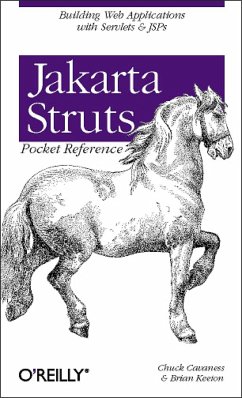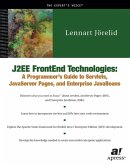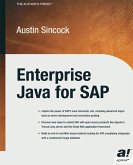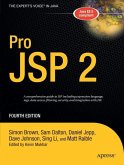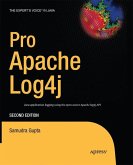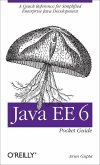Web tier frameworks have soared in popularity over the past year or so due to the increasing complexity of Java itself, and the need to get more work done with fewer resources. Developers who used to spend hours and hours writing low-level features can use a well-written framework to build the presentation tier so they start coding the "good stuff" sooner--the business logic at the core of the program. The Jakarta Struts Framework is one of the most popular presentation frameworks for building web applications with Java Servlet and JavaServer Pages (JSP) technologies. If you work with the Struts Framework, then you know it speeds development time. You also know that many of its features are made up of components that are used repeatedly. Having to stop to check each component's parameters and programming details can be a time waster. The answer? The Jakarta Struts Pocket Reference. This portable book gives you easy access to the facts you need to get your job done.
The Jakarta Struts Pocket Reference is a quick reference to all the core features of the Jakarta Struts framework. An excellent companion to Programming Jakarta Struts, the pocket reference contains detailed information on the extensive Struts tag libraries, which were described in less detail in the larger work as they were still in development at that time. This little book also provides convenient coverage of the following: * Configuration
* Built-in Action classes
* Action forms * Complete Tag Reference (struts 1.1)
and much more.
O'Reilly's Pocket References have become a favorite among programmers everywhere. By providing a wealth of important details in a concise, well-organized format, these handy books deliver just what you need to complete the task at hand. When you've reached a sticking point and need to get to the answer quickly, the new Jakarta Struts Pocket Reference is the book you'll want close at hand.
The Jakarta Struts Pocket Reference is a quick reference to all the core features of the Jakarta Struts framework. An excellent companion to Programming Jakarta Struts, the pocket reference contains detailed information on the extensive Struts tag libraries, which were described in less detail in the larger work as they were still in development at that time. This little book also provides convenient coverage of the following: * Configuration
* Built-in Action classes
* Action forms * Complete Tag Reference (struts 1.1)
and much more.
O'Reilly's Pocket References have become a favorite among programmers everywhere. By providing a wealth of important details in a concise, well-organized format, these handy books deliver just what you need to complete the task at hand. When you've reached a sticking point and need to get to the answer quickly, the new Jakarta Struts Pocket Reference is the book you'll want close at hand.

